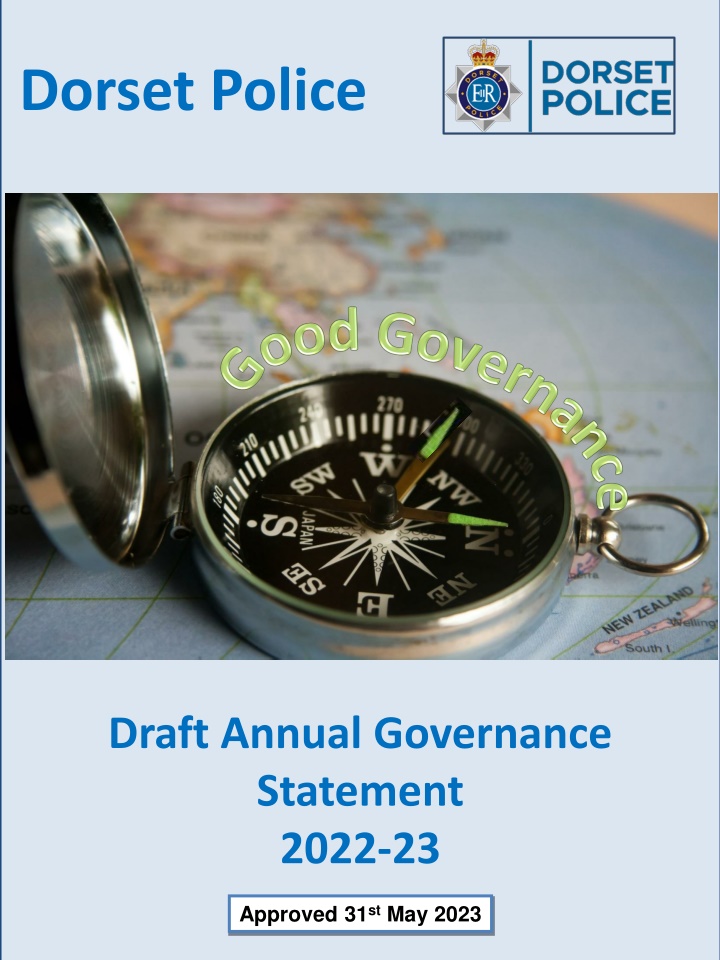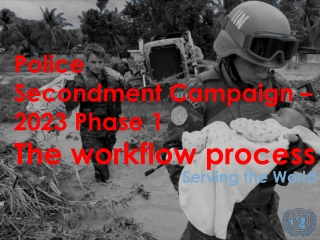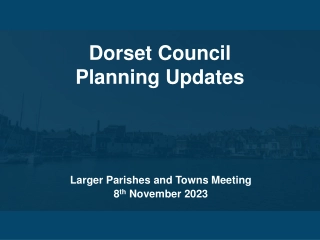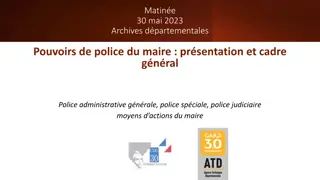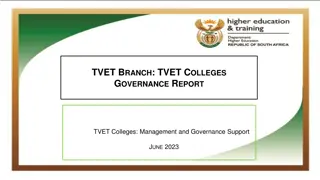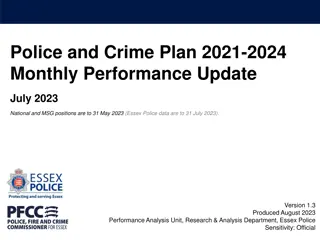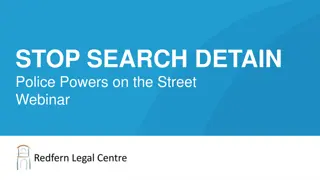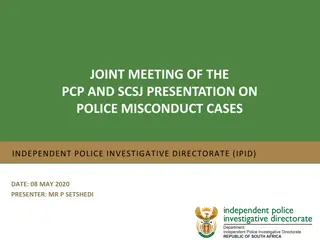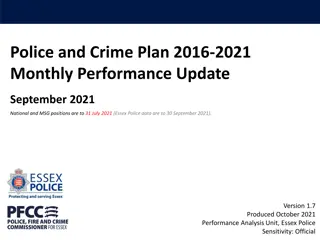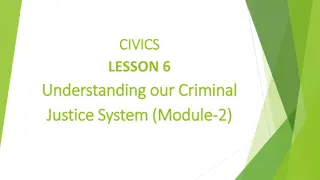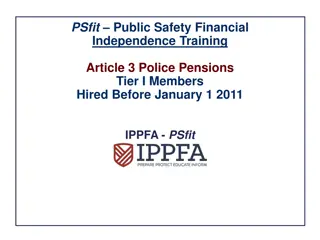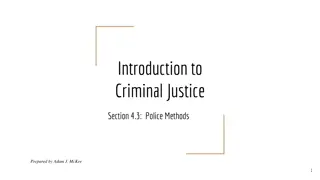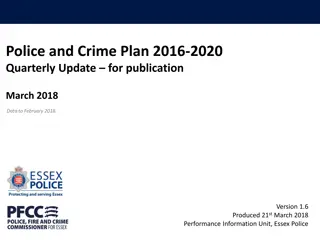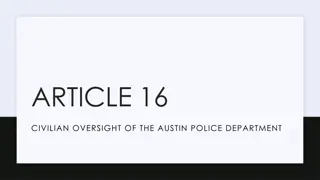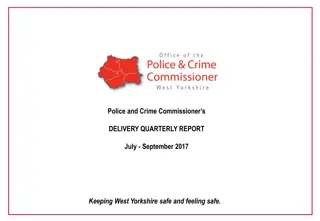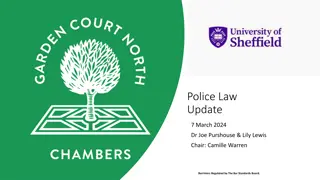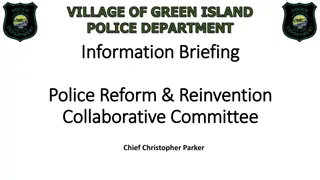Dorset Police Annual Governance Statement 2022-23 Summary
The Dorset Police Annual Governance Statement outlines the roles and responsibilities of the Chief Constable and Police & Crime Commissioner in ensuring efficient and effective policing, financial management, and accountability. It highlights the importance of good governance practices, internal control systems, and risk management within Dorset Police. The statement emphasizes integrity, stakeholder engagement, sustainable outcomes, capacity development, transparency, accountability, and strong financial management. It also explains the Corporate Governance Framework's role in monitoring strategic objectives and service delivery effectiveness.
Download Presentation

Please find below an Image/Link to download the presentation.
The content on the website is provided AS IS for your information and personal use only. It may not be sold, licensed, or shared on other websites without obtaining consent from the author.If you encounter any issues during the download, it is possible that the publisher has removed the file from their server.
You are allowed to download the files provided on this website for personal or commercial use, subject to the condition that they are used lawfully. All files are the property of their respective owners.
The content on the website is provided AS IS for your information and personal use only. It may not be sold, licensed, or shared on other websites without obtaining consent from the author.
E N D
Presentation Transcript
Dorset Police Draft Annual Governance Statement 2022-23 Approved 31st May 2023
The Chief Constable is accountable in law for the exercise of police powers, and to the Police & Crime Commissioner for the delivery of efficient and effective policing, management of resources and for ensuring the public money allocated to Dorset Police is safeguarded, properly accounted for, and used economically, efficiently and effectively. She is accountable for the functions of officers and staff under her employment, direction and control. The Police and Crime Commissioner has responsibility for the totality of policing in Dorset and is held to account by the Dorset Police and Crime Panel, which consists of representatives from the local authorities. Scope of Responsibility In executing their overall responsibilities the Police and Crime Commissioner and the Chief Constable are responsible for maintaining proper arrangements for the governance of their affairs, ensuring their functions are carried out effectively and that there is a reliable system of internal control and arrangements for managing risk. Their respective legal duties and responsibilities are clearly defined within the following: Police Reform and Social Responsibility Act 2011 Policing Protocol Order 2011 Financial Management Code of Practice for the Police and Fire & Rescue Services 2018 Strategic Policing Requirement 2023 To support the delivery of their legal responsibilities the Chief Constable and Police & Crime Commissioner have established a Corporate Governance Framework that includes the Code of Corporate Governance. The code is consistent with the CIPFA SOLACE Framework for Delivering Good Governance Guidance Notes for Policing Bodies 2016. This statement explains compliance to the code and the Accounts and Audit (England) Regulations 2015 requirement that all relevant bodies prepare an Annual Governance Statement. CIPFA stands for the Chartered Institute of Public Finance and Accountancy, SOLACE is the leading members' network for local government and public sector professionals throughout the UK. SOLACE stands for the Society of Local Authority Chief Executives. 2
The Code of Governance sets out the principles of good governance and describes the arrangements that the Chief Constable and Police & Crime Commissioner have put in place to meet each of these principles. A copy of the Code of Corporate Governance is available on the Police & Crime Commissioners website at www.dorset.pcc.police.uk or can be obtained from the Head of Audit, Insurance and Risk, Dorset Police, Force Headquarters, Winfrith, Dorchester, Dorset DT2 8DZ. A. Behaving with integrity, demonstrating strong commitment to ethical values, and respecting the rule of law B. Ensuring openness and comprehensive stakeholder engagement D. Determining the interventions necessary to optimise the achievement of the intended outcomes C. Defining outcomes in terms of sustainable economic, social, and environmental benefits E. Developing the entity s capacity, including the capability of its leadership and the individuals within it G. Implementing good practices in transparency, reporting, and audit, to deliver effective accountability F. Managing risks and performance through robust internal control and strong public financial management The Corporate Governance Framework sets out the systems and processes, culture and values by which the Chief Constable manages Dorset Police. This includes the leadership arrangements, methods of engagement and accountability to the communities the Force serves. This enables the Chief Constable to monitor the achievement of strategic objectives and to consider whether appropriate, cost effective services have been delivered. The The Framework establishes a system of internal control that is designed to manage risk to an acceptable level in accordance with the risk appetite . It cannot entirely eliminate the risk of failure to achieve strategic objectives but seeks to provide reasonable rather than absolute assurance of effectiveness. The system of internal control is based on an on-going process designed to identify, prioritise and manage the risks to the achievement of all aims and objectives. Purpose of the Corporate Governance Framework In addition the Scheme of Corporate Governance and Scheme of Delegation details arrangements for decision making which uphold the principles of the Policing Protocol Order, designed to ensure an effective and constructive working relationship between the Chief Constable and the Police & Crime Commissioner. 3
Key Elements of the Governance Framework Whilst the Chief Constable and the Police & Crime Commissioner (PCC) are two separate legal entities with separate statutory responsibilities, they work together to ensure Dorset Police is working effectively and is held accountable for the standard of service delivered to the public. The framework sets out the strategic and operational controls designed to facilitate the delivery of the objectives set out in the Police & Crime Plan to local communities. The structures, processes, risk management and other internal control systems, such as codes of conduct, form part of the framework designed to manage the barriers to the achievement of the strategic plan. The Chief Constable is responsible for putting in place proper arrangements for the governance of affairs and the management of resources. This is achieved through the force executive, which includes the Chief Constable, the Deputy Chief Constable, the Assistant Chief Constables, the Director of People and Support Services and the Chief Financial Officer. The force executive also meets on a regular basis with the Police and Crime Commissioner and his Strategic Management Team. This team includes the Section 151 Officer, the Chief Executive, who is also the Monitoring Officer and the Director of Operations. The Force Executive and the OPCC Strategic Management Team meet regularly to review performance and the use of resources at the Joint Leadership Board and the Resource Control Board. The Force Executive receives reports from a variety of other Boards, some of which include representatives from the Office of the Police and Crime Commissioner. These Boards deal with such things as ethics and standards, performance, operations, information, business and innovation. Business continuity and covid security have been a priority during the pandemic to support effective service delivery. Governance arrangements are regularly reviewed by the Independent Audit Committee. To achieve their objectives, the Chief Constable and the Police & Crime Commissioner have designed systems and processes to regulate, monitor and control their activities. The Corporate Governance Framework sets out the controls in full. The financial management arrangements are compliant with the governance requirements set out in the CIPFA Statement of the Role of the Chief Financial Officer in Local Government (2015) and the CIPFA SOLACE Delivering Good Governance in Local Government: Framework (2016 Edition). The Chief Finance Officer (CFO) of the Office of the Police and Crime Commissioner and the CFO for the Dorset force carry out their duties with due regard to the principles set out in the CIPFA Role of CFO s in Policing (March 2021). 4
Chief Constable and the Police and Crime Commissioner The Chief Constable and Police & Crime Commissioner (PCC) have responsibility for conducting an annual review of the effectiveness of the governance framework, including the system of internal control. The Audit, Insurance and Strategic Risk department manages that review. It is informed by internal and external audit, and Her Majesty s Inspectorate of Constabulary, Fire and Rescue Service (HMICFRS). The Independent Audit Committee reviews elements of the governance framework throughout the year. Review of Effectiveness The review of effectiveness for 2022-23 concluded that there is substantial evidence of good governance against each of the seven CIPFA principles. This means: the areas reviewed are adequately controlled; internal controls are in place and operating effectively; and risks against the achievement of objectives are well managed. Internal Audit The internal auditors continue to complete the annual programme of audits throughout the year. The plan is risk-based and can be changed to cover emergent risks. This process included all key financial systems with recommendations for improvement provided to the relevant manager and the Independent Audit Committee. Based on the assurance work undertaken, the internal audit annual report on internal audit activity provides rolling assurance opinion. External Audit The external auditor delivers an audit opinion based on their verification of the financial accounts. During the year External Audit gave an unqualified opinion on the Group, Police & Crime Commissioner and Chief Constable s financial statements 2020-21. The external audit annual report 2020-21 published in January 2023 provided commentary on the arrangements for securing value for money. Arrangements for financial sustainability and improving economy, efficiency and effectiveness found no significant weaknesses. The audit of the financial statements 2021-22 has started but not yet completed. 7
Principles of Good Governance and the Annual Governance Statement The Chief Constable and PCC remained flexible in their approach to the delivery of governance during 2022-23. An increased use of technology supported virtual meetings and provided opportunities for new and agile ways of working. The increase in home working and the reduction in travel continue to be monitored and used to assess savings and long- term changes to priorities, programmes and strategies. Review of Effectiveness Independent Audit Committee The Independent Audit Committee challenges and monitors financial management, performance and policies on an on-going basis. The Committee also considers the effectiveness of risk management arrangements. Two new members joined the Committee in September 2022, bringing additional knowledge and experience of financial accounts and counter fraud. A new Chair and Vice Chair were elected. The Committee Chair keeps issues under review through meetings with the Executive and Chief Officers. Virtual meetings continued throughout 2022-23. Committee members worked together, to develop and use their knowledge and expertise, and that of others to the best effect. They have a non- political, evidence-based approach that has been proven to achieve good results. To support their roles, all Committee Members regularly reviewed and considered their training requirements. Meeting virtually enabled the Committee to provide continuous independent scrutiny and advice. Assurance and recommendations have been provided on the adequacy of the governance and risk management frameworks, the internal control environment and financial reports. 8
Ethics Committee The Dorset Ethics committee is independently chaired and consists of a variety of officers and staff who have volunteered to represent their colleagues. The committee meets periodically throughout the year to discuss and debate ethical dilemmas that have been submitted by officers and staff. Her Majesty's Inspectorate of Constabulary and Fire & Rescue Services (HMICFRS) The HMICFRS (police effectiveness, efficiency and legitimacy) assessments published in April 2022 rated the Force as good at preventing crime and in supporting the workforce. A number of areas were graded as adequate including, treating the public with fairness and respect, protecting vulnerable people, managing offenders and suspects. Review of Effectiveness continued The report detailed two areas that were graded as 'requires improvement', namely how the force is responding to the public and investigating crime. Both areas had been previously identified by the force and formed part of the Continuous Improvement Plan created at the start of 2021 and monitored by the Executive. Resource Control Board The Chief Constable and the Commissioner are dedicated to ensuring that resources are utilised in the most effective and efficient manner. The Resource Control Board meets monthly to monitor the management of resources including land, property, finance, projects and people. The Board receives regular reports on workforce supply, litigation, capital monitoring and group financials, which has supported the achievement of the strategic objectives as recorded in the Annual Report. The board is responsible for ensuring all decisions are sustainable and consider the environmental agenda. This year the PCC and Chief Constable considered and agreed the headquarters rebuild project, and continued the research and investment in the purchase of electric vehicles and associated infrastructure.
Joint Leadership Board The Chief Constable and PCC meet with executive members to provide leadership, set the strategic direction and monitor the governance required to achieve objectives. Review of Effectiveness continued The Board is responsible for financial planning and reviews the position statements provided by the executive business leads to ensure oversight across the organisation. National Assurance The Joint Leadership Board meets monthly to ensure timely and effective decision making. The Chief Constable is a member of the National Police Chiefs Council (NPCC) which brings forces together to coordinate operations, reform, improve and provides value for money. Deputy Chief Constable s Board The Deputy Chief Constable (DCC) chairs the Deputy Chief Constables Board which is attended by Senior Managers and Chief Officers to discuss strategic planning and improvements. The board meets monthly and considers progress on actions from the HMICFRS, items from the Continuous Improvement Board, ICT and wellbeing issues. The DCC is also responsible for the force engagement strategies and meetings are regularly attended by Senior Managers from the Corporate Communications and Engagement team. 10
PRISM Board PRISM stands for the police response investigation and safeguarding model . The PRISM Board manages the key change, transformation and continuous improvement programme. This board has continued to drive change activity to ensure the delivery of predicted benefits and monitor improvements across both Dorset and Devon & Cornwall Forces. Financial reports are reviewed alongside local, regional and national programme updates, which includes the assessment of risks and delivery timescales. Chief Constable and Chief Officer Engagement The Chief Constable and the Chief Officer team regularly communicate with police officers and staff. There is a weekly General Orders publication written by the Chief Constable that reports on the delivery of priorities and changes in legislation and establishment. Review of Effectiveness continued Every member of the Force is expected to work towards the delivery of the Chief Constables vision to create a safe county for everyone . This is supported by six principles linked to the objectives of the police and crime plan. The six principles are :- Relentless pursuit of criminality Putting victims first Exceptional local policing Ethical and inclusive Innovating, transforming and improving Enabling people to deliver excellence 11
Working Together Board The Working Together Board continues to be the forum for making key strategic decisions and providing governance and oversight on the strategic alliance. This is a quarterly meeting of the two Chief Constables, two Police and Crime Commissioners, two Deputy Chief Constables, two Chief Executives, and four Chief Financial Officers representing the four policing legal entities (corporations sole) from Dorset and Devon & Cornwall. The existing shared business areas are kept under regular review to ensure that the outputs being delivered meet today s needs. To ensure this, the Working Together Board has agreed that annual reviews should take place for each business area, with a focus on service delivery, sequenced so that the outputs of the review can feed into the development of the Force Management Statements for each force. Review of Effectiveness continued Equality, Diversity and Inclusion Board The Equality, Diversity and Inclusion Board meets to promote these values across the workforce, in order to better represent local communities. The equality, diversity and inclusion strategy centres on four key pillars Represented, Respected, Involved and Protected and these form the core commitments. The Board holds departments accountable for their responsibilities under the Equality Act 2010, monitors activity towards equality objectives and the delivery of the public sector equality duty. This information supports focus on equality issues,with the details of current initiatives recorded in the Gender Pay Gap report. 12
Key Governance Principles Each year, the Chief Constable and Police & Crime Commissioner review governance arrangements against delivery of service. The assessment of governance arrangements against the seven CIPFA principles of good governance conducted by the Audit, Insurance and Strategic Risk department considers the effectiveness of a range of evidence from strategies, policies and procedures to independent reviews, audits and inspections. Behaving with Integrity, demonstrating strong commitment to ethical values and respecting the rule of law The OPCC Treasurer and the Force Chief Finance Officer (CFO) work closely together to ensure compliance with the governance requirements set out in the CIPFA Statement on The Role of the CFO of the OPCC and the CFO of the Chief Constable . A series of executive level meetings are held between the Force and OPCC to secure the most efficient use of public funds. The principles of goodwill, professionalism, openness and trust underpin their relationship. The Professional Standards department monitors conduct and standards of behaviour. There is a robust complaints handling process with significant cases referred to the Independent Office of Police Conduct for independent review. and an appeals process handled by the Office of the Police and Crime Commissioner. The Whistle Blowing Policy supports the confidential reporting processes and any conflicts of interest are formally managed. The OPCC Chief Executive has responsibilities as the Monitoring Officer for ensuring the Force and OPCC remain compliant to laws and regulations. They are also responsible for advising the Commissioner on policy and strategy and for the commissioning and delivery of contracted services. Compliance to laws, regulations, policies and procedures are evidenced by the relatively low level of liability claims and legal challenge against the Force. The joint Legal Services Department provides support and advice on legal matters. The Force Chief Finance Officer is responsible for the integrity of financial controls and securing compliance with the Financial Regulations agreed with the OPCC Treasurer. 13
Public consultation and surveys are undertaken to assess victim satisfaction and public confidence. This data is analysed and used to inform strategic operational plans which support the achievement of the Police and Crime Plan objectives. Survey results are monitored quarterly and considered against the achievement of local and strategic plans. Ensuring openness and comprehensive stakeholder engagement The Force website provides the public with full details of how to best contact the Force according to their need. The website supports openness and transparency relating to all Force activities, and provides links to the Dorset OPCC website and other multi-agency partnerships that provide direct or indirect services to the public. Defining outcomes in terms of sustainable economic, social and environmental benefits The annual Force Strategic Assessment evaluates overall Force capacity and capability through demand and performance analysis. This supports the development of sustainable operational plans that deliver effective policing over the longer term. The Commissioner s Police and Crime Plan is the strategic plan that sets clear objectives for service delivery. The Chief Constable directs and monitors the effective delivery of operational policing, whilst mindful of the long term objectives set out by the Commissioner. Information on the achievement against the strategic objectives are available to the public on the OPCC website. Corporate Governance arrangements set out the decision making framework for the organisation. Details of strategic decisions jointly made by the Chief Constable and the Commissioner are published on the OPCC website. 14
The Deputy Chief Constable Performance Board meets to consider overall Force performance and service delivery. Commanders, senior managers and business leads are accountable for the performance of their respective business areas. Determining the interventions necessary to optimise the achievement of intended outcomes The achievement of strategic organisational objectives are benchmarked against progress on the national and regional programmes, to ensure timescales and financial costs are managed to completion. Change is managed centrally by the Business Change Department, which considers ideas for improvement and creates a structured programme for delivery. The recommendations identified by Her Majesty s Inspectorate of Constabulary (and the Fire and Rescue Service) are developed into action plans. Any Lessons learnt are recorded and improvements implemented to increase performance and maximise the use of resources. Strategic plans for the training of leadership and senior officers are developed, which are supported by sound financial planning and decision making. Developing the entity s capacity including the capability of its leadership and the individuals within it To support this, all roles have job descriptions that clearly define their responsibilities, with appraisals completed annually to assess individual performance and to identify any personal development training requirements. The roles and responsibilities of senior management, officers and staff are matched to required skills within the organisations structure. Training and recruitment plans are then developed to ensure that the right skills are available in the right place at the right time. Regular assessments are completed to ensure future resources are well equipped to meet predicted demand. 15
There are effective counter fraud and corruption procedures in place across both organisations, with close-knit working arrangements between Professional Standards, Audit, Finance and Legal Services. Regular reports are provided to the executive on the effectiveness of arrangements with independent scrutiny provided by the internal auditors on any weaknesses identified. This includes regular review of the controls in place to prevent financial error or fraud. Strategic risks are managed through an effective risk management framework designed to provide assurance reports to the executive. Managing risk and performance through robust internal control and strong public financial management Dorset Police complete the mandatory National Fraud Initiative. All irregularities are investigated and reported to the Cabinet Office who set the initiative, and are considered by the Independent Audit Committee. No incidents of fraud or corruption were detected from the matches created from the data submission in 2020-21. The matches identified for the 2022-23 initiative have been provided by the Cabinet Office and will be investigated over the financial year. Internal audit provides objective scrutiny and assurance on the controls in place that prevent error, fraud or corruption. The service is provided in line with the requirements of the CIPFA statement on the Role of the Head of Internal Audit. The Chief Constable and Commissioner are required to provide adequate resources and open access to any information requested by the auditors. Implementing good practices in transparency, reporting and audit to deliver effective accountability The Independent Audit Committee is a key component of corporate governance. Its purpose is to review the Corporate Governance Framework and provide independent assurance on the adequacy of internal controls and financial management. External audit provide independent scrutiny of the financial arrangements and accounts. This allows them to form an opinion on the financial statements and a commentary on the arrangements for Value for Money. 16
This statement is intended to provide reasonable assurance on governance arrangements. It is stressed that no system of control can provide absolute assurance. In conclusion, no significant governance issues have been identified during this year s review. For completeness the minor issues identified recorded below will be addressed to ensure continuous improvement. Significant Governance Issues MINOR ISSUES FROM DRAFT STATEMENT 2021-22 PRINCIPLE Implementing good practices in transparency, reporting and audit to deliver effective accountability Determining the interventions necessary to optimise the achievement of intended outcomes ISSUE That shared decision-making meets the needs of both Forces. UPDATE Carried forward to 2022-23: Governance arrangements across both Forces have been reviewed. However, the connectivity between boards requires further clarification to ensure transparency of decisions made. The development of compliance to the Code of Financial Management. Complete: The implementation of the Code of Financial Management action plan following the resilience review. Complete: The PEEL inspections are due to resume in 2022 and any actions identified will be progressed as a priority. Delays to the HMICFRS PEEL inspections due to the pandemic have reduced assurance on the Efficiency, Effectiveness and Legitimacy of the force. Delivering organisational compliance to the national sustainability agenda 2030 Carried forward to 2022-23: To develop and progress an organisational sustainability plan. Defining outcomes in terms of sustainable economic, social and environmental benefits The effectiveness of revised force governance arrangements. Carried forward to 2022-23: The terms of reference for the force strategic boards require review. Implementing good practices in transparency, reporting and audit to deliver effective accountability Corporation soles and the public are not able to challenge the finances of the organisations in a timely way due to delays with local audit delivery by Grant Thornton. Carried forward to 2022-23: Robust Internal audit and robust internal financial reporting to the Corporation soles has been put in place to mitigate this risk. In addition the publication and explanation of non audited accounts to the public remain in statutory limits, therefore summary accounts will be prepared earlier for the 2021-22 financial year. Complete: Additional resources have been made available to Finance during the 2021-22 year. Finance capacity will be further reviewed following the audit report recommendations. The External Audit Annual Report 2020-21 (issued in March 2022) found governance arrangements to be effective but highlighted a significant weakness in the finance teams capacity during the 2021-22 year. 17
MINOR ISSUES IDENTIFIED 2022-23 PRINCIPLE ISSUE ACTION Brought forward: Governance arrangements across both Forces have been reviewed. However, the connectivity between boards requires further clarification to ensure transparency of decisions made. That shared decision-making meets the needs of both Forces. Implementing good practices in transparency, reporting and audit to deliver effective accountability Delivering organisational compliance to the national sustainability agenda 2030 Brought forward: To develop and progress an organisational sustainability plan. Defining outcomes in terms of sustainable economic, social and environmental benefits Implementing good practices in transparency, reporting and audit to deliver effective accountability The effectiveness of revised force governance arrangements. Brought forward: The terms of reference for the force strategic boards require review. Corporation soles and the public are not able to challenge the finances of the organisations in a timely way due to delays with local audit delivery by Grant Thornton. Brought forward: Robust Internal audit and robust internal financial reporting to the Corporation soles has been put in place to mitigate this risk. In addition the publication and explanation of non audited accounts to the public remain in statutory limits, therefore summary accounts will be prepared earlier for the 2021-22 financial year. A review of the revised governance arrangements. Potential instability caused by the change in the Chief Constable and Senior Executive Following the uplift programme focus on recruitment and retention will continue, potentially impacted by the cost of living crisis and the restrictions of public sector pay Developing the entity s capacity including the capability of its leadership and the individuals within it Behaving with integrity, demonstrating strong commitment to ethical values, and respecting the rule of law Inexperienced workforce The costs created by the national demand for the re-vetting of Police Officers and Staff. Consideration will be given to the findings of the national review of vetting standards so that resources can be diverted to support force vetting. 18
The Corporate Governance Framework adopted by the Chief Constable and the Police & Crime Commissioner demonstrates all the elements required to support effective governance. The annual assessment of arrangements during 2022-23 has provided an overall assurance opinion of substantial. Opinion and signature Chief Constable Amanda Pearson Chief Finance Officer Neal Butterworth Dated: Dated: 19
